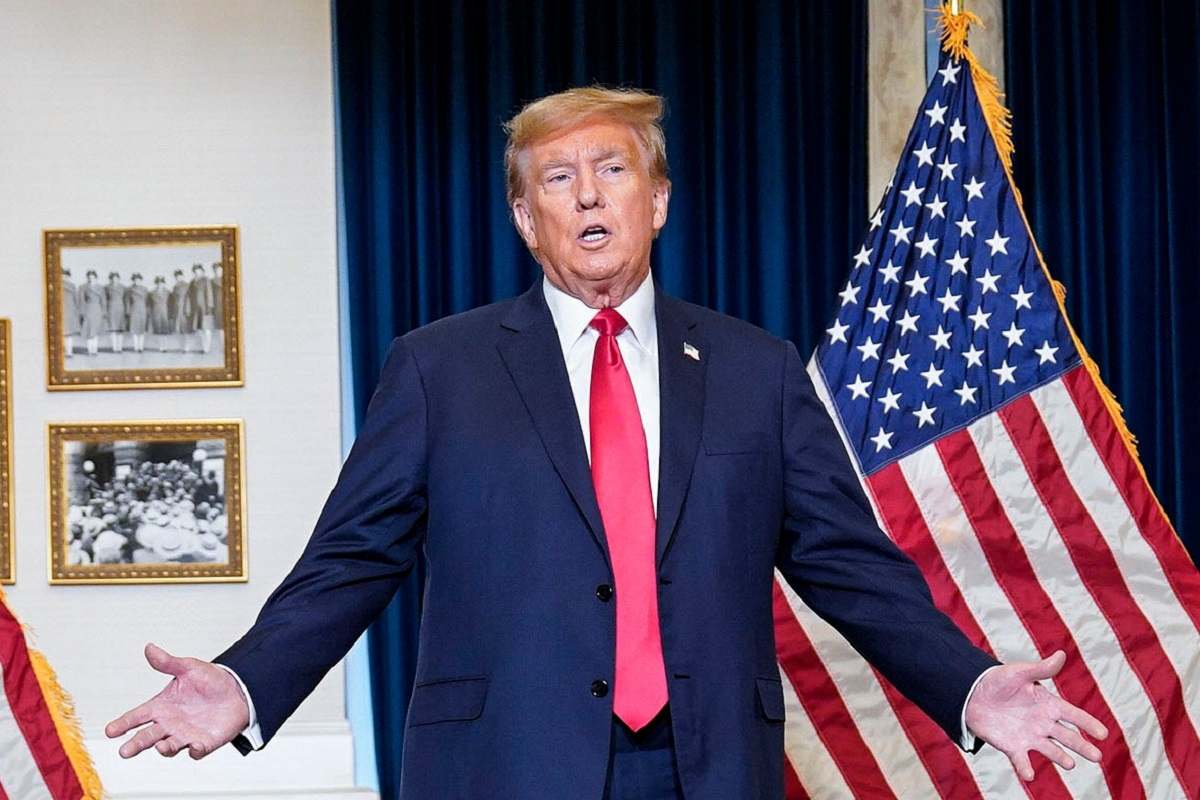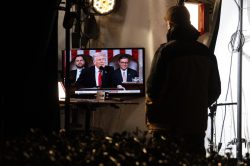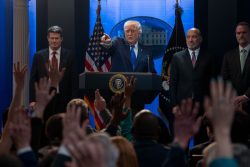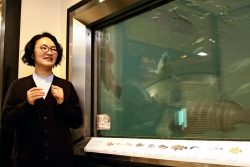
Former president Donald Trump speaks to the media at the Waldorf Astoria hotel following his appearance at the U.S. Court of Appeals for the D.C. Circuit in January.
12:44 JST, September 25, 2024
A federal judge on Tuesday granted prosecutors’ request to file an up-to-180-page legal brief this week arguing why Donald Trump’s efforts to overturn the 2020 election should not be immune from criminal prosecution, rejecting the former president’s claims that its timing was unfair or politically motivated with the election fast approaching.
U.S. District Judge Tanya S. Chutkan agreed with special counsel Jack Smith’s office, which argued that the extra-long briefing was necessary because the Supreme Court’s July ruling on presidential immunity required her as trial judge to decide what allegations and evidence against Trump could be admissible.
“The Supreme Court directed this court to conduct a ‘close’ and ‘fact specific’ analysis ‘of the indictment’s extensive and interrelated allegations,’” including Trump’s alleged interactions with state officials and private actors and his communications, Chutkan wrote in a nine-page opinion that quoted from the Supreme Court ruling. “The length and breadth of the Government’s proposed brief reflects the uniquely ‘challenging’ and factbound nature of those determinations. The briefs’ atypical sequence and size thus both serve the efficient resolution of immunity issues in this case ‘at the earliest possible stage.’”
The filing is a key part of the criminal case alleging Trump illegally attempted to overturn Joe Biden’s electoral victory, and prosecutors said it would include up to 90 pages of previously disclosed evidence as well as new facts, and 30 pages of footnotes to attached exhibits. But new details will initially be kept under seal, as prosecutors requested, with a public version with redactions to be released later with Chutkan’s approval.
The filing is due Thursday and prosecutors indicated they would have it to the court by 5 p.m., but it remains unclear exactly which portions will be made public and when.
In opposing the government’s request Monday, Trump’s defense pointed out that a 180-page brief would be four times the usual 45-page limit and repeated previously overruled objections that a “180-page false hit piece” was fundamentally affair before the election. They had wanted to initiate the action in the case, with prosecutors responding to legal filings they made seeking to throw out prosecutors’ slimmed-down indictment. The special counsel’s office had proposed that Chutkan weigh all immunity-related issues at once, warning that serial appeals by Trump otherwise could bog down his case for years.
Chutkan rebutted claims raised by Trump lawyers John Lauro and Todd Blanche one by one. Allowing the government to go first was not “contrary to law, procedure and custom” the judge said, “It is simply how litigation works.” Each side would have a fair chance to present arguments and evidence on whether Trump’s conduct involved official acts and deserved immunity, and no single filing would establish anything, she wrote.
Similarly, Trump’s arguments that “the absolute nature of immunity” require the court to first consider tossing out the indictment, as well as all conversations with his vice president, Mike Pence, “necessarily require the very briefing that the court has ordered,” Chutkan wrote. “Trying to resolve those issues before the scheduled immunity briefing would put the cart before the horse.”
Trump’s legal team had characterized prosecutors’ proposed brief as a “premature and improper special counsel report” that would present privacy concerns for potential witnesses and uncharged parties, and they asserted that the former president would be barred from responding to it on the campaign trail because he is under a limited gag order in the case. Chutkan, though, noted that both sides fall under a protective order limiting disclosure of sensitive information in the case, and she asserted that the defense gave no explanation for how its proposal to brief first would not raise the same concerns.
Trump is only barred from making or directing others to make public statements about potential witnesses’ participation in the case, she added. Chutkan said she has “front-loaded” the court’s schedule to allow the former president to try to pry out potentially helpful evidence from the government and will rule quickly to give Trump time to build his immunity arguments.
Chutkan concluded by repeating what she has told both sides in court, that electoral concerns were not relevant to her proceedings. While Justice Department guidelines generally counsel prosecutors against timing actions that could impact the outcome of an election, Trump’s defense did not explain how those purported violations caused legal prejudice against him, “nor how this court is either bound by or [authorized] to enforce” such policy, the judge wrote.
Top Articles in News Services
-

Survey Shows False Election Info Perceived as True
-

Hong Kong Ex-Publisher Jimmy Lai’s Sentence Raises International Outcry as China Defends It
-

Japan’s Nikkei Stock Average Touches 58,000 as Yen, Jgbs Rally on Election Fallout (UPDATE 1)
-

Japan’s Nikkei Stock Average Falls as US-Iran Tensions Unsettle Investors (UPDATE 1)
-

Trump Names Former Federal Reserve Governor Warsh as the Next Fed Chair, Replacing Powell
JN ACCESS RANKING
-

Producer Behind Pop Group XG Arrested for Cocaine Possession
-

Japan PM Takaichi’s Cabinet Resigns en Masse
-

Man Infected with Measles Reportedly Dined at Restaurant in Tokyo Station
-

Israeli Ambassador to Japan Speaks about Japan’s Role in the Reconstruction of Gaza
-

Videos Plagiarized, Reposted with False Subtitles Claiming ‘Ryukyu Belongs to China’; Anti-China False Information Also Posted in Japan

























